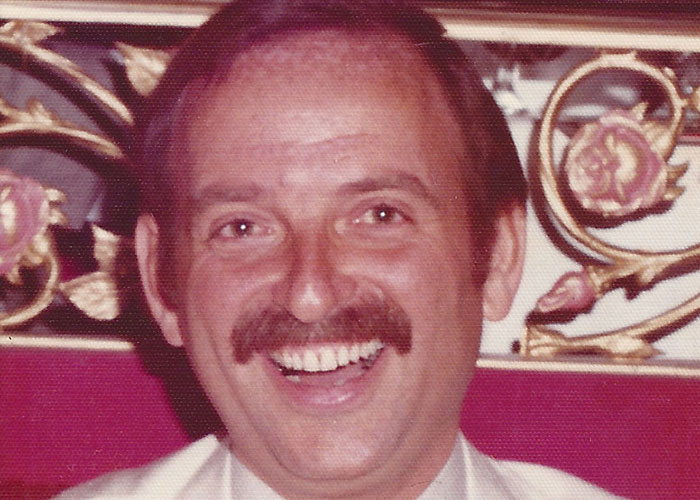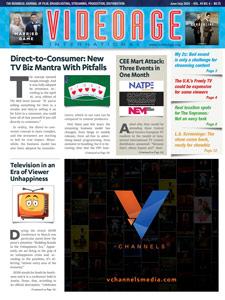Peter Felix Leda of Argentina’s Ledafilms can still speak German, even though he left his native Hamburg as a newborn in 1938, five years after Hitler took power and raised the Judenfrage. Leda’s paternal grandfather had moved to Hannover, where Peter’s father Benno was born, but later settled in Hamburg.
Looking to escape from Nazi Germany before the war, Benno wanted to take the family to the U.S., but he was unable to get visas. Finally, he managed to buy visas for his wife and son Peter at the Argentine Consulate.
The Leda family settled in Buenos Aires, where Peter, now Pedro, went to journalism school and started working as a reporter before joining the advertising agency Lowe Argentina as a 19-year-old copywriter for cinema advertising shorts in 1956.
That was his springboard for a career that is still going strong, and links the Leda name to U.S. studios such as 20th Century Fox, DreamWorks, Lucasfilm and Paramount. His career has also seen him operate out of Rio de Janeiro, Brazil; Miami, Florida and Los Angeles, California, in addition to his traditional base in Buenos Aires.
Today, Leda likes to look ahead. Indeed, on facing his biggest challenge, he said, “Probably [it is] ahead of us. To be successful in theatrical distribution, TVoD release, Free-TV creating windows to allow the broadcaster to access the movies earlier, Pay-TV and the new SVoD platforms. This is a challenge we really never had before.”
Back when he was at Lowe, Leda’s immediate supervisor was Carlos D’Agostino, a TV personality who created one of Argentina’s first independent television program production companies.
In 1958, Leda joined Ricardo De Luca Publicidad, one of the largest advertising agencies in Argentina, as head of the television, radio and cinema advertising department. He soon became responsible for the production of 11 live TV shows per week, along with their accompanying commercials. That job lasted two years, before he ventured on his own into the advertising business.
At the same time, his father Benno was heading advertising sales for the newly created local private television station, Canal 9.
When he arrived in Buenos Aires, Benno met a fellow German Jewish immigrant, Kurt Lowe, who was starting a cinema advertising business. When Pedro began working for Lowe as a copywriter, his father was Lowe’s sales VP in Chile, and when he returned to Argentina to take over the same position at Lowe in Buenos Aires, Pedro was already working for De Luca. Later, in addition to running his agency, Lowe started Canal 9 and Benno followed him there. Canal 9’s shareholders included the American TV network NBC. The channel is now owned by Albavision’s Miguel Ángel González.
Pedro was barely on his own a year when Benno introduced him to Leon Darcyl, who was 17 years Pedro’s senior and a brilliant journalist who served as Argentina’s correspondent for the French magazine, Paris Match. Recalled Pedro, “Darcyl had started importing French TV programs to Argentina, and we decided to join forces and founded Telefilms in 1961. He was in charge of acquisitions, and I was in charge of sales.”
Leda recognized the abundant opportunities in the nascent production and distribution TV arena at a time when many TV shows were still broadcast live. He recalled, “In the ’50s, there was only one network in Buenos Aires, Channel 7. Program distributors did not have to carry movie projectors, because all had 16-mm projectors, but they traveled with a lot of 16-mm reels.”
He continued: “From a very humble beginning, Telefilms evolved into a very successful television program production company and Latin American distributor.”
The partnership lasted until 1974, when Leda sold his share in Telefilms to Darcyl and started Ledafilms. Ever since, the history of the company and its founder and chairman have been intertwined. Today, Telefilms is headed by one of Darcyl’s sons, Tomas.
“In those days,” Leda said, “Latin American free-TV networks were eager to buy over 50 percent of their programs from overseas producers. The challenge was being able to acquire or produce good product for international distribution.”
The quest to find good product to distribute in Latin America also brought Darcyl to Italy and to international TV markets such as MIP-TV, and Leda to Rio de Janeiro.
Recalled Leda, “In the mid-’60s, Leon decided to open a film and television program distribution company in Brazil called Teleshow, and I headed that operation between 1969 and 1973.”
Max Gusberti, at that time head of SACIS, the program sales division of Italy’s RAI, still remembers when “Leon Darcyl, a cigar-smoking Argentinean who bought most of RAI’s variety shows that Telefilms successfully distributed throughout Latin America,” arrived at his offices in 1965.
Leda, whose first MIP-TV was in 1969, recalled hearing about the market in Cannes through his partner Leon, who traveled to Europe often and even attended the first MIP in Lyon in 1963. “All activities were held in the Old Palais, mainly on the terrace overlooking the sea,” said Leda, “I remember that there were not too many exhibitors and buyers. Negotiations were very relaxed. Everybody had all the time in the world! I also remember meeting the nephew of the then-French President Charles de Gaulle, who attended MIP, perhaps on behalf of a French ministry or state television. He was very tall and looked a lot like his uncle.”
A few months after launching Ledafilms, Twentieth Century Fox International TV named Leda as its sales agent for Argentina, Uruguay and Paraguay, a relationship that lasted up until 1996. Two years after that relationship ended, Ledafilms was appointed sales agent for DreamWorks SKG, which continued until 2014. From 2006-2014, Ledafilms became sales agent for Paramount Pictures and from 2011-2013 it was sales agent for Lucasfilm.
From its inception, Ledafilms experienced rollercoaster economies in Latin America, but, said Leda, “there were regions that had economic problems and others that were in good shape, so they balanced out. We sold programs in U.S. dollars and at a certain point, instead of being paid in U.S. dollars, we received bonds.
“We did quite well, since the Argentinean government honored those bonds and they accrued interest, [but] we had to spend a lot of time on the financial aspect of the business, more so than on sales and acquisitions.”
In the mid-1990s, Ledafilms opened a U.S. office housed at its Los Angeles-based subsidiary, Independent International Television, Inc. And those were the times that brought the greatests enjoyment: “[We had the best time] when all our TV clients were fighting for our product. I am talking about the late 90s,” he commented.
From 2002-2006, Ledafilms also operated from a Miami, Florida office before, as Leda explained, “we decided to concentrate operations between our Los Angeles and Buenos Aires offices.”
Over the years, Ledafilms has developed several activities: local film and TV production, television distribution of mainly U.S. productions, magazine publishing (comic books) and a children-oriented home video label. Additionally, they have dabbled in theatrical and, more recently, digital platform distribution.
Asked what he attributes his business success to, Leda answered, “Personal relationships. This business depends a lot on personal relationships with the producers and with the buyers. I’ve never done business in textiles or oil, but I imagine that other businesses are less personal than our business.”
Looking back there is one incident with a client that Leda likes to recall: “I have a story that was not so funny at the time, but it is now. In the 70s, I screened for a client the 16mm pilot of a TV series. After the lights came on he asked me for the license fee. When I mentioned it, he practically threw me out of his office. The following year, he pleaded with me to meet him again. Which I did. And I screened for him the same pilot I had showed him the previous year. He watched it as if it would have been his first time. When the lights came on, he asked for the license fee. I mentioned exactly the same price I had told him the year before. He immediately agreed and asked me to send him the license agreement, which he signed and soon after paid in full.”
by Dom Serafini
Audio Version (a DV Works service)










Leave A Comment